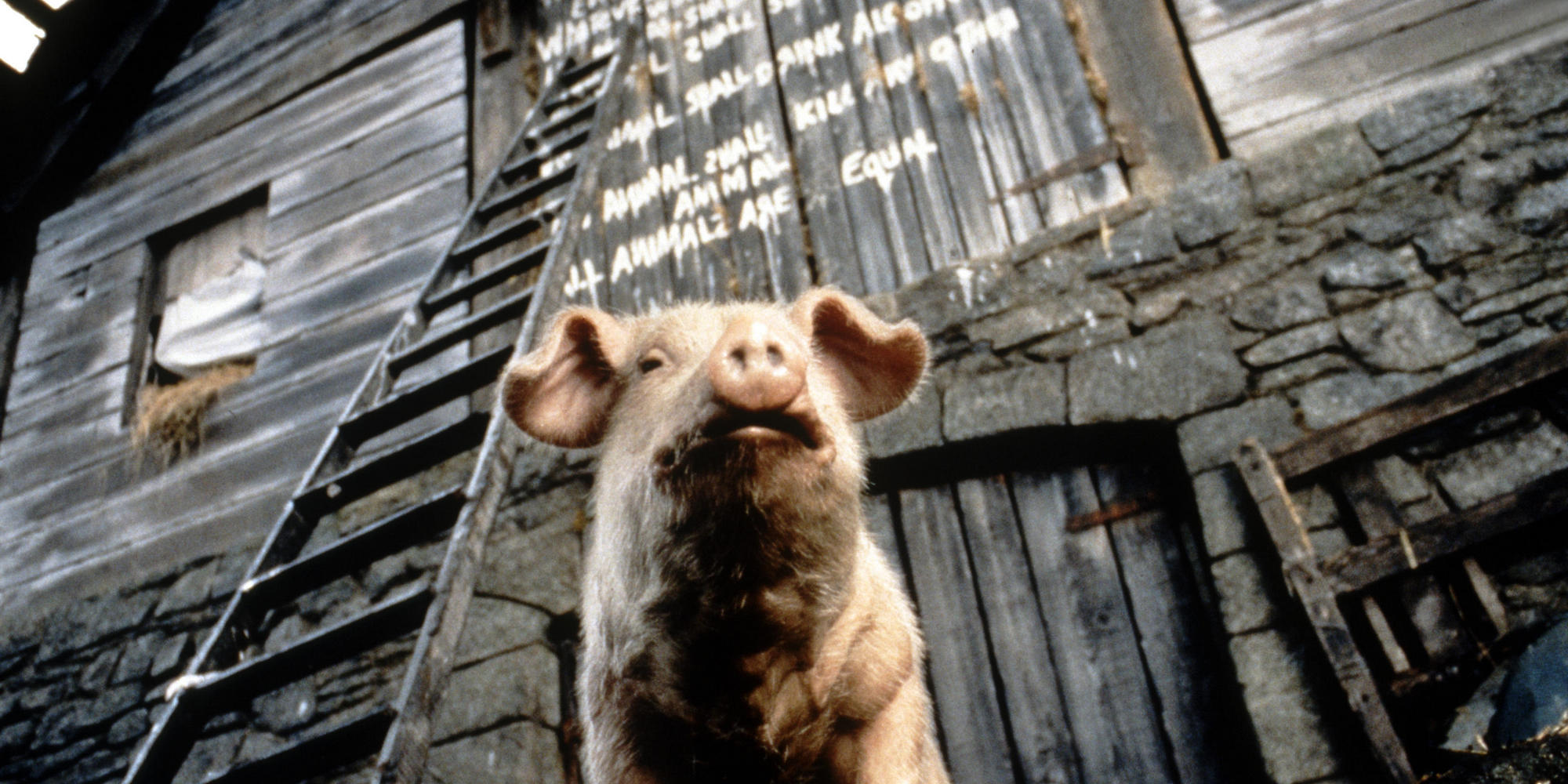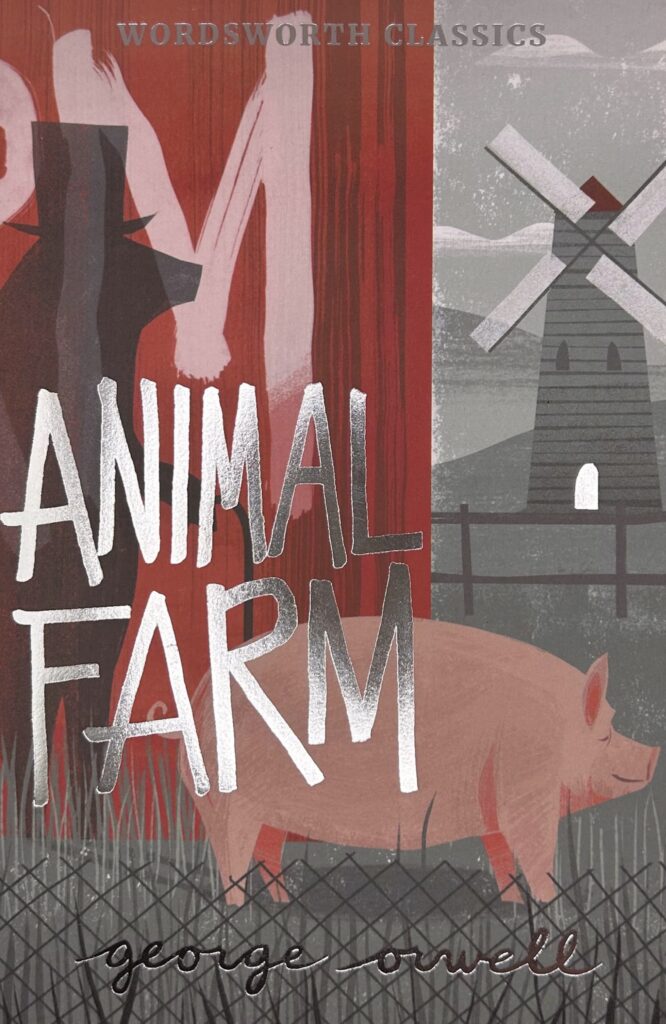
Mr Orwell dramatised
Part One: Animal Farm. David Stuart Davies looks at the various attempts to dramatise George Orwell’s allegorical novella of Stalinist Russia.
‘All animals are equal but some animals are more equal than others’
Eric Arthur Blair, novelist, essayist and journalist was born in 1903. You will know this remarkable man of letters as George Orwell who produced at least two of the greatest novels of the mid-twentieth century. His most famous books are Animal Farm (1945) and Nineteen Eighty-Four (1950). Both are clever pessimistic satires about the threat of political tyranny. While each novel carries a strong message, they are wrapped up in engaging narratives, which appeal to a wide readership.
At first glance, Animal Farm appears to be a dark fairy tale but it is a satirical allegory directed primarily against Stalin’s Russia and the failure of the revolution to bring justice to the people. The success of the fable is that it can be enjoyed on both levels – that of an anthropomorphic fantasy or a serious political commentary. Manor Farm is Russia and the drunken, incompetent farmer Jones the Czar. The farmyard animals represent the individuals involved in the conflict, such as the pigs: Old Major (Lenin), Snowball (Trotsky) and Napoleon (Stalin) while the dogs are his secret police. By having the animals casting out the lazy incompetent Jones, taking over the farm and running it themselves Orwell’s allegory suggests that rather than eliminating the capitalistic regime as it was intended, the Russian revolution merely replaced it with another corrupt hierarchy.
An animated movie based on the novel was released in 1954 from the Halas & Bachelor Studio, directed by the founders John Halas and Joy Bachelor. The film was commissioned in 1951 but because of the slow painstaking process of animation at the time, it took three years to complete, involving eighty animators. Remarkably, the funding for the project came from America, from the Central Intelligence Agency to be precise. The CIA saw the movie as part of the American offensive during the Cold War and they influenced the presentation of Orwell’s ideas, including the ending of the movie, the message of which stated that ‘Stalin’s regime is not only as bad as Jones but worse and more sadistic’. Some criticism was levelled at this harsher ending, with one newspaper reporting, ‘Orwell would not have liked this one change, with its substitution of commonplace propaganda for his reticent melancholy satire.’ However, the American backers were delighted; they thought it made their point very effectively.
Remarkably all the animal voices and noises in the film were voiced by one actor: Maurice Denham. The visual styling, which was created deliberately to attract a young audience, was regarded by the film critic of the Guardian as ‘Disney-turned serious’. The movie is now regarded as a classic.
In 1950 the British Foreign Office secretly hired artists and writers Norman Pett and Don Freeman to adapt Animal Farm into a comic strip. This was not published in the U.K. but ran in a number of foreign newspapers.
A TV movie of the novel appeared in 1999 and it too received criticism because of the altered ending. In this version, after Napoleon’s dictatorship has led the farm into self-destruction, with only a few good animals surviving, a car arrives with a farmer, his wife and children – the new owners of Manor Farm. Jessie, the kind and wise old sheepdog (who acted as the storyteller, voiced by Julia Ormond) states that she will not let this family ‘make the same mistakes of the neglect of Jones or the abuse of Napoleon, and is aware that the small remnant of animals will now have to work alongside the new masters to restore the Farm. A rosy glow finale which is not quite what George Orwell intended.
In general, the movie was criticised for its loose adaptation of the book and its simplicity. In particular, it was regarded as too dark and political for children while being too simplistic for adults. In this version real animals were used along with CGI versions of the main characters created by Jim Henson’s Creature Shop (home of the Muppets) which gave a greater sense of reality to the story.
While Maurice Denham was the solo voice artist in the 1954 movie, this production boasted a raft of star names voicing the animals including Peter Ustinov (Old Major), Patrick Stewart (Napoleon), Kelsey Grammer (Snowball), Paul Scofield (Boxer) and Ian Holm (Squealer). There were rumours in 2012 that Andy Serkis was about to direct a 3D version of the book but nothing came of this.
Interestingly, it was radio that first came up with a dramatised version of the story of Animal Farm. A BBC radio adaptation scripted by Orwell was broadcast in January 1947. The production met with his full approval. Sadly he died in 1950 and so never lived to see the Halas-Bachelor movie.
There was a further radio production in January 2013, which also used the author’s own dramatisation of the book, broadcast on Radio Four. Tamsin Gregg narrated and the cast also included Nicky Henson as Napoleon, Toby Jones as Squealer and Ralph Ineson as Boxer.
There have been two stage adaptations of the book. In 1985 a version with music by Richard Peaslee and lyrics by the left-wing poet Adrian Mitchell was staged at the National Theatre and directed by Peter Hall. A one-man play written and performed by Guy Masterton premiered at the Traverse Theatre in Edinburgh in January 1995.
It is probably true to say that while the fantasy element of the story – animals taking control of their own destiny – still has the power to engage an audience, perhaps the political elements of the tale, which are in essence specific to a particular time frame, are somewhat dated and lack the potency they had when the book was first published. Whether we shall see another dramatised version is a matter for conjecture.
Image: SNOWBALL, ANIMAL FARM Film1999. Credit: AA Film Archive / Alamy Stock Photo
Books associated with this article
